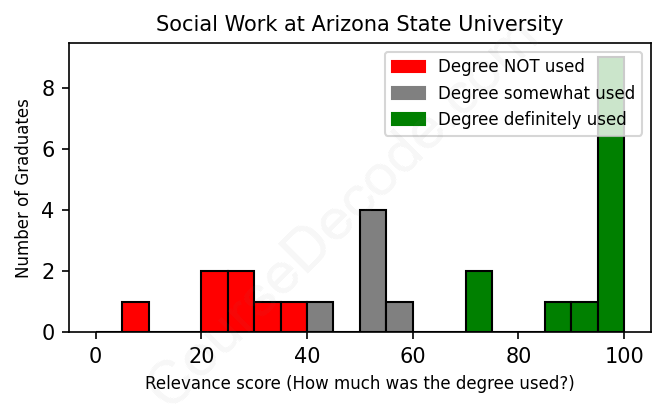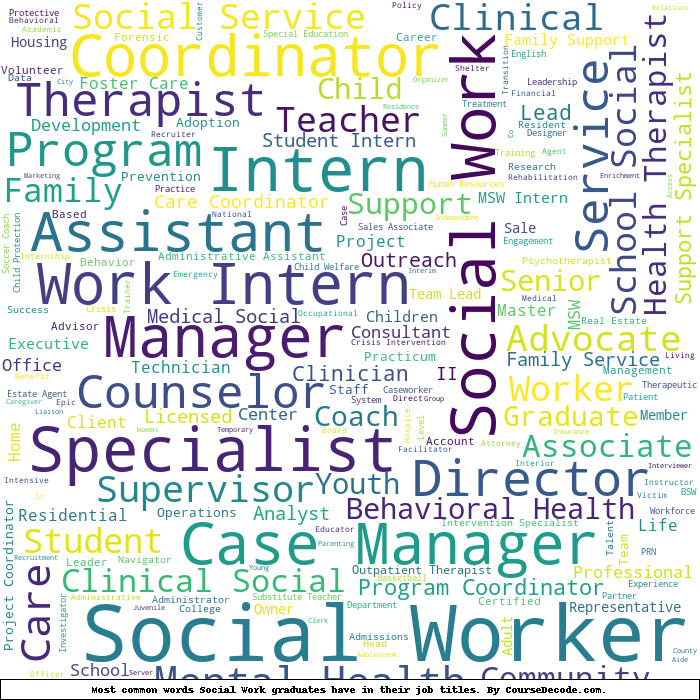
First, some facts. Of the Social Work graduates from Arizona State University we've analyzed , here's how many have used (or NOT used) their degree in their career:

These are estimates based on AI analysis of 26 LinkedIn profiles (see below).
The verdict? Slightly below average. Overall, with an average relevance score of 64%, Social Work graduates from Arizona State University have a slightly lower likelihood (-3%) of finding work in this field compared to the average graduate across all fields:
And for comparison, here's the chart for all profiles we've looked at across all degrees.
Also, after graduating, 42% of these graduates have pursued further education other than another Bachelor's degree (such as a Masters degree or other), compared to the average across all profiles of 35%. This suggests you may need more than just a Bachelors degree to be competitive as a Social Work graduate.
See the details:
|
Relevance score: 33% We think this person has NOT gone into a career related to their degree. We think this person has NOT gone into a career related to their degree.
DEGREE INFOGraduated in 2013 from Arizona State University with a Bachelor's degree in Social Work. No other secondary education since. JOB HISTORY SINCE GRADUATIONHousekeeper Self employed Jun 2018 - Jun 2020 Office Manager  DESERT CHAPEL UNITED METHODIST CHURCH Jun 2020 - Jun 2024 ABOUTHi, Right now I am only looking for part time and or weekend work. I start my Nuclear Medicine in August...I love nature and people and getting out and being with animals. |
The top 10 most common jobs done by the graduates we've analyzed (ranked most common to least) are:
Analyzing the career paths of graduates from Arizona State University's Social Work program reveals a pretty mixed bag. Many of the individuals pursued jobs that are directly relevant to social work, like becoming social workers in various settings such as hospitals, schools, and community organizations. Roles such as Psychiatric Social Workers, Heart Transplant Social Workers, and other specialized social support positions strongly align with the core competencies of a social work degree, showcasing a genuine application of their academic background in real-world settings. Additionally, various counseling and clinical roles also imply a direct use of the skills learned during their studies.
On the flip side, there's a notable number of graduates who ended up in jobs that don't really relate to social work at all. For instance, positions like Sales Associate, Administrative roles, and even working in financial institutions appear frequently. Many of these jobs may involve soft skills like communication or empathy that could have been enhanced during their education, but they lack the meaningful application of social work principles. Overall, while a good portion of the alumni utilize their social work training in impactful ways, it's clear that not everyone has remained in the field, indicating a significant divergence in career paths after graduating.
Here is a visual representation of the most common words in job titles for Social Work graduates (this is across all Social Work graduates we've analyzed, not just those who went to Arizona State University):

From analyzing the career trajectories of Arizona State University social work graduates, it’s clear that people have followed varied paths. Many of them landed their first jobs in roles that are somewhat tangential to social work, like being a sales associate or working in administrative positions. For instance, some graduates took jobs as new student advisors, medical case managers, or even roles in human resources right out of school. While these positions may use some social work skills, they don’t necessarily align directly with the core mission of social work.
However, after about five to ten years, the picture starts to change for some of these graduates. A notable number have made their way into more relevant social work roles, such as child welfare specialists, social workers at medical facilities, and even clinical directors, suggesting that with experience and possibly further education, many are carving out impactful careers in social work. On the flip side, there are still graduates who seem to have steered away completely from traditional social work paths, finding themselves in sectors like retail, administration, or even marketing roles. All in all, while some find strong footing in social work career paths, others take a less-than-direct route, leaving their social work degree on the back burner for now.
Honestly, a Bachelor’s degree in Social Work can be a bit challenging, but it’s also super rewarding! At Arizona State University, like many other programs, you'll dive into complex topics like human behavior, ethics, and community dynamics, which can require a good amount of critical thinking and emotional intelligence. There will be some tough coursework and plenty of reading, plus fieldwork experiences that can be both intense and eye-opening. While it might be tougher than some other majors, it really depends on your interests and how much you’re willing to engage with the material. If you're passionate about helping others and ready to put in the effort, you'll likely find it manageable and fulfilling!
Most commonly, in the LinkedIn profiles we've looked at, it takes people 2 years to finish a Bachelor degree in Social Work.
Looking at these ASU social work grads, it seems like they're mostly earning decent money, but it's a bit of a mixed bag. The ones in higher roles, like the Senior Clinical Director and those in more specialized medical positions, likely snagged a good paycheck, especially at places like Mayo Clinic and Tufts Medical Center. However, some are still working in pretty entry-level jobs or part-time roles in social services, like the New Student Advisor at University of Phoenix. Overall, while some are probably doing quite well, especially with their advanced degrees and experience, others might not be raking in the cash as much as they would hope in the social work field, which can be challenging to break into financially.
Here is a visual representation of the most common words seen in the "about" section of LinkedIn profiles who have a Bachelor degree in Social Work (this is across all Social Work graduates we've analyzed, not just those who went to Arizona State University). This may or may not be useful:

Here are all colleges offering a Bachelor degree in Social Work (ordered by the average relevance score of their Social Work graduates, best to worst) where we have analyzed at least 10 of their graduates: